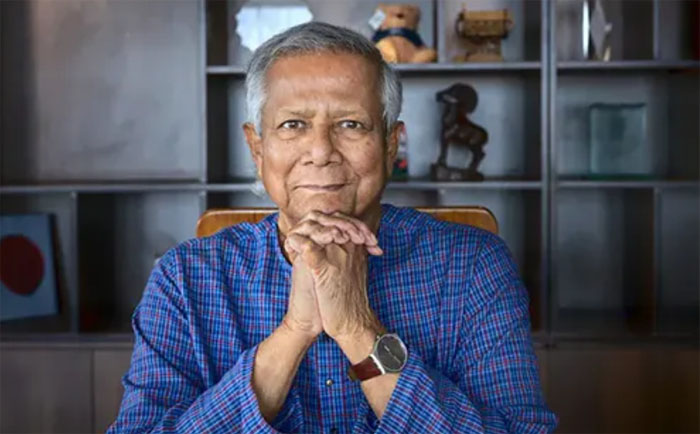News Desk : dhakamirror.com
Nobel Peace Prize winner and globally acclaimed economist Professor Muhammad Yunus was sworn-in as the chief adviser to the interim government of Bangladesh Thursday evening (8 August).
President Mohammed Shahabuddin administered the oath of office to the 17-member interim government.
Leaders of various political parties including BNP, Jamaat-e-Islami, Jatiyo Party, Krishak Sramik Janata League, were present at the ceremony, among others.
Besides, Army Chief General Waker-Uz-Zaman and other officers, secretaries of various ministries, diplomats of various countries, also attended among more than five hundred people at the event.
Earlier in the day, an Emirates flight (EK-582) carrying Yunus, who had been in France for a minor medical procedure, landed at Hazrat Shahjalal International Airport around 2:15 pm local time.
Army Chief Waker-Uz-Zaman and key organisers of the Anti-Discriminatory Student Movement welcomed Yunus at the airport.
The interim government has been formed today after Sheikh Hasina resigned as prime minister and fled the country on 5 August following the student-led mass uprising.
During the early hours on Monday (6 August), Nahid Islam, one of the coordinators of the Anti-discrimination Student Movement, announced in a video message that they want Dr Yunus as the chief advisor of the interim government.
According to media reports, Dr Yunus initially declined the students’ request but ultimately gave his consent to be the chief adviser following persistent appeals.
“When I was contacted on behalf of the students, I didn’t agree at first. I told them I have a lot of work to finish. But the students repeatedly requested me,” The Daily Star quoted Yunus via a source.
Prof Yunus, Bangladesh’s sole Nobel laureate, is internationally recognised as a pioneering social entrepreneur and economist.
Renowned as a “global citizen,” he has been honoured with the Presidential Medal of Freedom, the highest civilian award in the United States.
Yunus gained worldwide acclaim for founding the Grameen Bank in 1983, a revolutionary institution that pioneered microcredit and has empowered millions through microfinance.
Born in Chattogram in 1940, Yunus completed bachelor’s and master’s degrees at Dhaka University before pursuing advanced studies in economics at Vanderbilt University in the United States through a Fulbright scholarship. He earned his PhD in Economics in 1969.
Upon returning to Bangladesh, Yunus took on the role of head of the economics department at Chittagong University in the mid-1970s. During this period, his groundbreaking work began. Observing the plight of impoverished basket weavers, Yunus started providing small loans, a precursor to the establishment of the Grameen Bank in 1983.
This revolutionary approach transformed the lives of millions, earning Yunus the title “Banker to the Poor.” The Grameen Bank model has since inspired similar initiatives in over 100 countries worldwide.





















